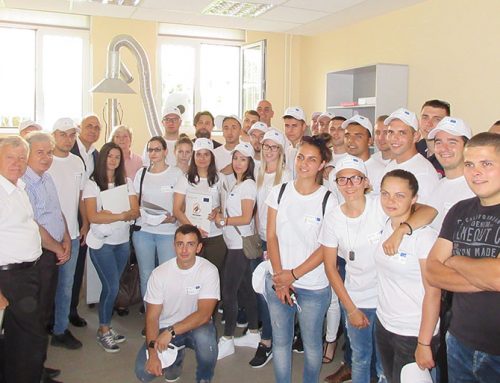Annually, some 5,000 tons of waste is accumulated in healthcare institutions in Serbia, of which one- fifth is hazardous waste. The introduction of infectious medical waste management system is very important for the improvement of public health and health care quality.
Needles, syringes, bandages, gauze, swabs smeared with blood, scalpels – for years were thrown together with other waste, mixed with municipal waste and disposed at the city landfill. Until 2008, there was no system of infectious medical waste management in Serbia. Health care facilities treated medical waste with obsolete equipment and without the existence of clear procedures for waste disposal and treatment. Some institutions burned the waste in their own incinerators, usually at temperatures that were unsuitable for its safe destruction. In a small number of institutions, the sterilization of waste was performed. The inadequate treatment of medical waste could have threatened human health and led to the spread of infectious diseases.
Medical waste poses a serious health and hygiene risk for health care workers, patients and employees who are involved in its collection. It is estimated that about 5,000 tons of waste is created in health care institutions in Serbia annually, of which one-fifth is hazardous waste. In Belgrade health care centers alone, 1kg of hazardous medical waste remains from 100 interventions. The introduction of the waste management system is of great importance for the improvement of public health, the quality of health care and environmental protection. Serbia had to change the manner in which it managed medical waste in order to implement European experience and practices in this area. Disposal of medical waste in this manner was part of the activities of several ministries of harmonization of Serbian regulation with the European Directives on waste and with the codes of good practice of the European Union (EU).
European Union Donation
The Serbian government adopted the National Strategy for Waste Management in 2003, but the management of this waste was delayed for several years. EU (as part of the CARDS programme) helped Serbia to initiate the establishment of a modern system of infectious medical waste management.
From 2007 until 2013, the EU secured a donation through two projects (total value of 13.5 million euros) and supported the introduction of a modern system of medical waste management. “Projects funded by the European Union are of great importance in solving the problem of medical waste in Serbia. Until we received EU assistance, all waste was disposed of with municipal waste at the landfill, which was very bad for the environment,” said Berislav Vekic, at the time Deputy Minister of Health.
As a result of the first project “Technical Assistance for Medical Waste Management”, a national guideline of good practices for the safe management of medical waste was developed as well as the Waste Management Manual. The project enabled the development of a system for the separation, collection, labeling, storage, treatment and disposal of medical waste.
EU assistance continued through the second stage of the project “Technical Assistance in Healthcare Waste Treatment in Serbia” (with 6 million EUR donation), which started in 2010. With the new donation, the EU provided support to improve the current waste management system in line with EU standards. “Support from the European Union in the field of medical waste management in Serbia was crucial for the establishment of a modern system of operations in this area in medical and veterinary institutions in Serbia,” said Verica Jovanovic, National Coordinator of the projects.
Thanks to this support, the curriculum for secondary medical schools was revised and a training program for health workers was created. The purchase of equipment for the treatment and transport of infectious waste has also been financed through the project, as well as funding for the collection, export and destruction of pharmaceutical waste, which for over 40 years, has been stored by health care institutions in Serbia.
Treatment of waste according to European standards
Among the health care institutions that received a donation is Primary Healthcare Center Nis (PHC). Although hospitals are the largest producers of medical waste, this PHC produces more than two tons of hazardous medical waste monthly which is transported and treated in a waste treatment facility in the nearby village Trupale. In this PHC more 200,000 inhabitants are treated.
In 2011, in the Nis PHC the infectious medical waste from seven district health care facilities, as well as from dozens of private practice health care facilities was treated. “Thanks to the support of the European Union, in the past five years, PHC Nis, but also the health system in Serbia as a whole, has reached an enviable level of regulation in this area from a situation in which there was no system of medical waste management, while the discarded medical waste posed a threat to human health (to both health care workers and users of health services) and the environment,” said Miroslav Rakocevic, Head of Unit for the Treatment of Medical Waste in PHC Nis.
“PHC Nis is an institution which in terms of management of medical waste draws a number of other facilities that provide health care services, both for the transportation and treatment of infectious waste, and for consulting, training, knowledge transfer and other forms of support“, Rakocevic said.
From 2010 until 2012, in the PHC Nis some 66 tons of infectious medical waste were transported and treated from the territory of several municipalities. “The population here is safer today and the environment less polluted with this dangerous waste,” Rakocevic said. For PHC Nis and other health care institutions, training for employees involved in the waste management system has been provided.
Health Center (HC) Zajecar also received a donation from the EU for the improvement of medical waste treatment. Yearly HC processes between 22 and 25 tons of medical waste, which is an average of 68 kg per day. Stanislav Tadic, Director of the Health Center said that “thanks to the EU, a system has been created which represents a major step of Serbian medicine towards a safer and healthier society, to a more organized and improved quality of health care in Serbia.” Treatment of infectious medical waste in Zajecar began in May 2008. With the new method of waste treatment, HC Zajecar has raised the level of health services, and particularly increased patient safety. “Today patient and staff safety at this facility is much higher. A large contribution towards improving environmental protection and prevention of infection which could have been caused by earlier bad practices of disposal of untreated waste to the city landfill “, said Dusan Simovic, a medical waste technician in the HC Zajecar.
From 2000 – 2013 the European Union has donated over 146 million euros to the health care system in Serbia through numerous projects.




